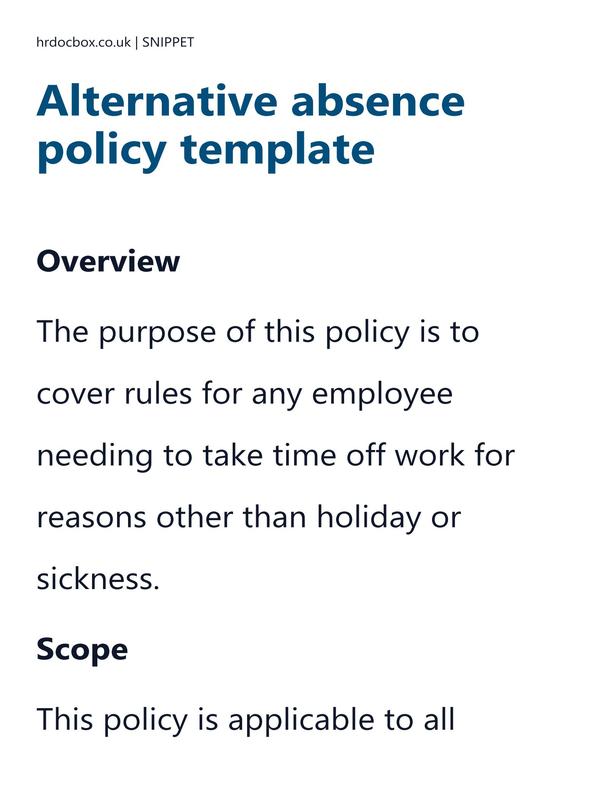Alternative absence policy template


Our Alternative Absence Policy Template streamlines managing non-holiday/sickness absences, fostering fairness and reducing disruptions.
- Includes 12 months' access to the Alternative absence policy template, with all updates provided free of charge and notified to you.
- UK-specific accuracy.
- 817 words over 3 pages.
- Last updated 24/01/2026.
- Format: Word / plain text / email.
- Delivery: Instant download after purchase (no physical item).
- Access: Download link shown here after checkout.
- This Alternative absence policy template will SAVE you up to 2 hours drafting & research, save you money, and reduce your risk.
Alternative absence policy
1 Overview
1.1 The purpose of this policy is to cover rules for any employee needing to take time off work for reasons other than holiday or sickness.
2 Scope
2.1 This policy is applicable to all employees of [company name].
3 General principles
3.1 Religious holidays
3.1.1 Subject to complying with the relevant provisions as to notice and to the requirements of the Company's business, you will normally be allowed to use your annual leave entitlement to observe special religious holidays.
3.2 Jury service and other public duties
3.2.1 Should you be called up for jury service or required to attend court to give evidence as a witness, you must notify your line manager as soon as reasonably practicable. Time off work will normally be granted in these circumstances. You will be required to provide a copy of the court summons to support your request for time off work.
3.2.2 You have no contractual or statutory right to be paid for time not worked due to jury service or other related public duties. Any payment of salary made by the Company during this period is done so in its absolute discretion and will be subject to the deduction of any monies received from the court in respect of loss of earnings. You must therefore submit a claim to the court for loss of earnings and claim the full allowance available to you.
If on any day on which you attend court you are told that your services are not required, you must then return to work and
This is a 30% preview of the Alternative absence policy template. For instant full access, purchase this item or a parent bundle.
Alternative absence policy template purpose
This policy is a set of guidelines and procedures to manage employee absences from work for reasons other than sickness and holiday. The policy may cover different types of absence, such as compassionate leave, and other types of leave.
The policy outlines how employees should request and book time off, how much time off they are entitled to, and any documentation or evidence required to support their request. The policy may also include details on how leave is calculated and how it affects an employee's pay and benefits.
The purpose of this policy is to ensure that employees are aware of their entitlements and obligations regarding time off work, and to provide a consistent and fair approach to managing absence across the organisation. By having a clear policy in place, employers can manage staffing levels, plan for any necessary cover or arrangements during an employee's absence, and ensure compliance with legal requirements.
Practical application of a Alternative absence policy template
- Issue the Alternative absence policy template during onboarding / after changes / planned refresher.
- Send it to appropriate internal recipients such as employees, workers, contractors etc. and request confirmation that is has been read and understood.
Compliance
Compliance
This Alternative absence policy template incorporates relevant UK laws and HR standards, including those listed below:
-
Equality Act 2010: Employers must ensure that their absence policy does not discriminate against any protected characteristic, such as age, gender, disability, race, religion, etc.
-
Employment Rights Act 1996: This act outlines the rights and obligations of both employers and employees, including the right to request time off for certain purposes, such as family emergencies or public duties.
-
Working Time Regulations 1998: Employers must ensure compliance with maximum working hours, rest breaks, and rest periods to prevent excessive absences due to overworking.
-
Parental Leave Regulations 2013: This legislation provides eligible employees with the right to take unpaid parental leave to care for their child.
-
Time off for Dependants: Employees have the right to take a reasonable amount of time off to deal with unexpected or emergency situations involving dependents (e.g., family members).
-
Flexible Working Regulations 2014: Employers must consider requests for flexible working arrangements from eligible employees, which may help manage attendance issues.
-
Trade Union and Labour Relations (Consolidation) Act 1992: Employers must be aware of employees' rights to time off for trade union activities or duties as representatives.
-
Health and Safety at Work etc. Act 1974: Employers are responsible for ensuring a safe working environment, reducing the likelihood of workplace accidents leading to absences.
-
Disability Discrimination Act 1995 (now part of Equality Act 2010): Employers must make reasonable adjustments to support disabled employees, potentially reducing disability-related absences.
-
Statutory Maternity/Paternity/Adoption Pay and Leave: Employers must provide statutory pay and leave entitlements for expectant or adoptive parents, promoting a healthy work-life balance.
Frequently Asked Questions about a Alternative absence policy template
Frequently Asked Questions about a Alternative absence policy template
-
Can I use the Alternative absence policy template in my small business?
Yes. The Alternative absence policy template is designed to be flexible and suitable for organisations of all sizes, including small businesses and charities. It follows UK employment law best practice, so even if you don't have an in-house HR team, you can confidently apply it.
-
Is the Alternative absence policy template compliant with 2026 UK employment law?
Absolutely. Like the Alternative absence policy template, all of our templates are drafted with the latest ACAS guidance and UK employment legislation in mind. We review and update them regularly, so you can be confident they remain compliant.
-
Can I customise the Alternative absence policy template for my organisation?
Yes, we highlight the areas of the Alternative absence policy template that you need to update with your own details, and where you need to make decisions to suit your situation. This saves you time and ensures that you meet best practice.
-
Do I get instant access to the Alternative absence policy template?
Yes. Once purchased, you'll be able to download the Alternative absence policy template instantly. Templates are provided in editable Word or Excel format so you can customise them easily, and in PDF format for easy sharing.
-
What if I need more help, not just a Alternative absence policy template?
If you're looking for broader support, we also offer toolkits and library bundles that include the Alternative absence policy template, along with other HR templates and policies for fully managing your situation. These may be more cost-effective if you need deeper advice.
-
Why should I use this Alternative absence policy template, and not AI to generate it?
The risk of using a free AI-generated template 'without review' includes your legal exposure, missing context, and no awareness of the wider process, whereas purchasing the Alternative absence policy template from us mitigates that risk.
